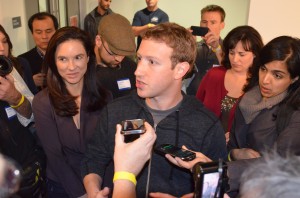Facebook is rolling out a major new search engine designed to give users more options in sorting through topics and interests based on their friends.
The social network is positioning the tool, dubbed “Graph Search,” as a way to make the site more useful, encourage people to share and “like” more, and increase connections between users. The feature is based on an engineering infrastructure that the site has been developing for years, said CEO Mark Zuckerberg during a press conference Tuesday at the company’s headquarters in Menlo Park, California.
While Facebook typically has served as a way for people to stay connected to the things they are already connected to, Graph Search will significantly broaden the site’s aim to also allow users to make new connections. “This is a trip back to our roots,” Zuckerberg said. “[It’s] something no other company has.”
Graph Search works by allowing users to type in a query, in plain English, in a new search field at the top of any Facebook page. A search can still be done for an individual person or group, just as the original search field functioned, but where Graph Search differs is that users can now search using phrases linked to specific interests and the likes of their friends.
For instance, users can type in, “Friends who like Star Wars,” or “Mexican restaurants in Palo Alto my friends have been to,” and a list of search results will immediately appear, either of those friends who have “liked” the movie “Star Wars” in the first case, or a list of restaurants, including some extra information about the businesses, in the latter search. Results are displayed based on importance, so a restaurant with more likes is likely to show up toward the top of the list. Other features besides likes, such as restaurant check-ins performed through Facebook, also factor in to how search results are displayed.
The Graph Search map, the company said, can serve as the basis for lots of different services for connecting users.
The tool, which is available now, is still in its very early stages. The beta version rolls out Tuesday on a limited basis to users on the order of hundreds or thousands, Zuckerberg said, and is years away from being complete. At the moment, Graph Search can only handle queries based on people, photos, places and interests.
“Graph Search is a really big project, and it’s going to take years and years to index the whole map of the graph,” he said. Development of the new search engine began in the spring of 2011.
Indexing all of the data is a “massive computer science problem for Facebook,” agreed analyst Brian Blau, Research Director at Gartner. But he maintained that the company can certainly pull it off and that Graph Search is a positive move forward for the social network.
In addition to the news feed and timeline, users will have another way to search for new things, he said.
Facebook’s “old search wasn’t that interesting; this is way more relevant,” Blau added.
During the event, Facebook fielded questions from the audience regarding privacy controls, including whether queries performed using Graph Search will allow people to see likes or other friends’ information that is hidden from their own timeline.
But Facebook executives assured attendees that with Graph Search users can only see content that they could see before, and users can only search for content that has been shared with them. The company is also rolling out more user-friendly privacy controls to keep users’ information hidden and make it easier to untag photos.
The company has also partnered with Microsoft’s Bing social search engine to fill in some of the gaps where Graph Search falls short, such as for weather reports or, say, new music releases. But Facebook stressed that Graph Search is based on indexing Facebook data and is not a Web search.
“We’re not saying, ‘this is the Web here,'” Zuckerberg said. “Graph Search is designed to take a precise query and return to you the answer, not link to others places where you might get the answer,” he said, referring to the pitfalls of a typical Web search.
The tech community has been abuzz since last year over rumours of a Facebook smartphone, but no plans for a phone or any other type of hardware were discussed during the press conference.






